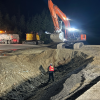The British Columbia government gave a green light to an 800-kilometre natural gas pipeline on Thursday, paving the way for construction to start this summer — and setting the stage for what one First Nations leader warns could be a “long, hot summer” of conflict.
The Prince Rupert Gas Transmission (PRGT) pipeline will carry gas from northeast B.C. to the proposed Ksi Lisims gas liquefaction and export facility on the northwest coast near the Alaska border, crossing more than 1,000 waterways, including major salmon-bearing rivers and tributaries.
In a press release, the BC Environmental Assessment Office gave the project a “substantially started” designation, locking in its original environmental approval indefinitely. That original approval — for the pipeline to end in Prince Rupert, B.C — was granted in 2014 and expired last November. The assessment office said enough construction occurred before the expiry date to earn it the designation, even though the pipeline’s new route takes it to a different location.
The decision to deem the pipeline substantially started was authored by Alex MacLennan, the chief executive assessment officer and deputy energy minister.
(5).jpg)
In a report outlining the reasons for the decision, MacLennan acknowledged that First Nations, including the Gitxsan Wilps, raised a range of concerns about the project, including the impact of greenhouse gas emissions and uncertainty about the pipeline’s final route. The assessment office is currently considering two requests from the proponents to change the pipeline’s route to serve the proposed Ksi Lisims LNG facility.
“Though I recognize that this provides some uncertainty regarding the final route of the project, the significant investment in, and pursuit of, the amendments indicate to me that PRGT Ltd. continues to invest in the project and is committed to the project being completed,” MacLennan wrote. “As for concerns regarding greenhouse gas emissions, this matter is not relevant to the substantial start determination.”
The Nisg̱a’a Lisims Government and Texas-based Western LNG are partnering to build the pipeline, after buying it from Calgary-based TC Energy last year. (TC Energy is the company behind the contentious Coastal GasLink pipeline, which saw protracted conflict during construction that led to more than 80 arrests of land defenders, observers and journalists.)
In a statement jointly written with Western LNG, Eva Clayton, president of the Nisga'a government, said: "This is an important step—not just for PRGT, but for the Nisga’a Nation’s vision of self-determination and long-term prosperity.”
While the Nisg̱a’a government has stated the project provides much-needed economic benefits to its citizens, other affected First Nations, including leaders in neighbouring Gitanyow and Gitxsan territories, have voiced their opposition and argue the PRGT pipeline will negatively impact lands and waters and populations of fish and wildlife.
In a statement, Simooget (Chief) Watakhayetsxw Deborah Good said the decision “isn’t the end of the story.” Watakhayetsxw was one of the Gitanyow Chiefs who set up a blockade last August when pipeline construction started, barring any industry-related traffic from passing through.
“We’ll continue to fight to protect our territory (Lax’yip) with all actions needed, in the courts and on the ground,” she said. “From August to November 2024, we denied access for PRGT pipeline construction and we’ll be continuing our efforts to ensure no construction happens on our territory,” she said.
Grand Chief Stewart Phillip, president of the Union of B.C. Indian Chiefs, said approving the pipeline directly contradicts the government’s stated commitment to upholding Indigenous Rights, which was passed into law in 2019 with B.C.’s Declaration on the Rights of Indigenous Peoples Act.
“There are First Nations who have very loudly stated their opposition to this pipeline and they will continue to do so,” Phillip said in a statement. “The Declaration Act and interim approach are being tossed out the window. This is not a government who believes in reconciliation and it could trigger a long, hot summer.”
PRGT decision ‘makes a mockery’ of substantial start designation
Naxginkw Tara Marsden, Wilp Sustainability Director with the Gitanyow Hereditary Chiefs, questioned whether the project met criteria for the substantial start decision.
While the definition of a substantial start is somewhat vague, the essence of the designation is an acknowledgement a project proponent has put in a significant amount of work to get a project going. The work done on the PRGT pipeline mainly consisted of clearing forest from a short section of the 800-kilometre route on Nisga’a lands.
“This decision makes a mockery of the true purpose and intent of what is considered to be a ‘substantial start’ for major infrastructure projects,” Naxginkw said in a statement. “It leaves us asking, ‘Why does the government have processes if it doesn’t intend to follow them and continues to exclude concerns raised by impacted First Nations?’ ”
The pipeline and associated liquefied natural gas (LNG) project, Ksi Lisims LNG, are the subject of three lawsuits by Indigenous and non-Indigenous communities and groups, including a legal challenge launched by Gitanyow Hereditary Chiefs.
“Our livelihoods depend on healthy and abundant sockeye from the Nass and Skeena rivers,” Naxginkw said. “This pipeline would cut across some of the healthiest intact salmon watersheds left in B.C.”
Naxginkw previously told The Narwhal the conflict over the pipeline is pitting nation against nation, which she said is a distraction from the real issue.
“We’re stuck in this cycle of people only paying attention when it’s that really heated, race-based conflict and the fact that this is nation to nation is even juicier,” she explained. “But that’s not the story — the story is the climate is going to kill us all.”
Natural gas is mostly composed of methane, a powerful greenhouse gas 80 times more powerful than carbon dioxide for its short-term warming impact on the planet. At every step of the process of extracting the fossil fuel for energy production — including at wellheads, along the pipeline and during the liquefaction, shipping, regasification and combustion processes — adds more greenhouse gases to the atmosphere, intensifying the effects of climate change.
When built, the Prince Rupert Gas Transmission pipeline will be able to transport 3.6 billion cubic feet of natural gas per day.








(5).jpg)








